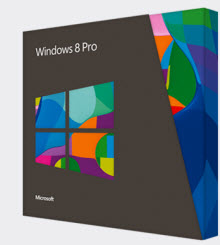How Microsoft can save Windows and maintain its iron grip over IT


Microsoft is reliant on PC sales to keep not only the dollars flowing it, but also keep the Windows operating system relevant. But PC sales are in a tailspin, and it looks like no one remembered to pack the parachute. This puts Microsoft on track for a world of hurt.
How long can the Redmond, Wash.-based software giant remain a giant in the face of dwindling PC sales and increasing competition from the likes of Android and iOS? My guess is not for long, unless the company takes some swift and serious action.
What sort of action? Here's a list:
Slash the price of Surface hardware
One of the cornerstones to Microsoft's Windows 8 strategy is its attempt to sidestep dwindling PC sales by creating a new demand for Windows in the form of tablets, and key to this is making its Surface hardware a success.
Problem is, nobody is expecting this to happen. While Apple shifted some 14 million iPads last quarter, Microsoft is only expecting to move between 3-5 million Surface tablets this quarter, and this should be a good quarter given that it is a holiday quarter.
What's the answer? Simple -- drop the price.
There's enough room for Microsoft to do this, especially if IHS iSuppli is right and the Surface is more profitable than the iPad.
A Surface RT tablet for $599 (including keyboard) would be a lot more compelling at $499. And given that the bill of materials including manufacturing costs come in at under $300, there's room for this to happen.
Permanently cut the price of Windows 8
Microsoft currently has all sorts of deals and promotions in place that allow consumers to pick up Windows 8 for less than it will cost in a few months.
See also: Windows 8: Do you need it?
While these deals are good for boosting initial take up, it's only a short-term measure. What would be better is if Microsoft actually priced Windows 8 upgrades at a more compelling level -- maybe not as low as the $19 that Apple charged for the last OS X update, but perhaps closer to $30 -- and kept that pricing for the life of the product?
Isn't Microsoft losing money? Sure, but remember that if since this is for upgrades, Microsoft is selling to people who have already paid Microsoft money in the past for a copy of Windows, so this low price is allowing them to upgrade at a competitive price. When users buy a new PC, they will pay Microsoft yet again for a new Windows license, thereby starting the cycle once more.
Bring back the Start Menu and Windows desktop
With Windows 8 Microsoft took the arrogant step of imposing big changes on users -- specifically desktop and notebooks users -- by imposing a touch-centric user interface on people who gain no benefit from it. While Microsoft claims the user interface is fast and fluid, usability experts have slammed it, calling it "confusing," and "disappointing" for "both novice and power users."
The solution is an easy one, but involves Microsoft having to admit to its mistake -- bring back the Start menu, and allow users to boot into the Windows desktop rather than the Start Screen.
If Microsoft were to do this -- say in the no-doubt forthcoming first Windows 8 Service Pack -- all the legitimate fears associated with adopting the new operating system on mainstream devices such as desktops and notebooks are eliminated, and Windows 8 becomes Windows 7, only better.
Get serious about Windows Phone
As ZDNet's Zack Whittaker put is so succinctly earlier, "if Windows Phone actually takes off, it'll likely be more by accident than anything else."
I agree with this statement on so many levels. If Microsoft is serious about mobile, in particular the smartphone market, then it needs to get serious and start splashing some serious cash around by doing a number of things:
- Buy Nokia. Google has Motorola, so it makes sense for Microsoft to have a hardware partner under its control;
- Focus on a broad range of hardware, ranging from budget to high-level;
- Focus on aggressive pricing to encourage adoption;
- Focus on getting developers on board, and keeping them happy.
Clarify the future
What does the future hold for Windows 8? Is Microsoft planning shift to a yearly release model where updates are cheap, or even free? Will tablets be upgradeable?
These, along with a myriad other questions like them about Microsoft's medium-term plans, are worrying people, and putting off both consumer and enterprise buyers.
Bottom line
While Microsoft continues to dominate the PC sector, the ground is shifting underneath it and it seems like Redmond isn't keeping up with the shift from a PC world to a post-PC world. If the company is to maintain its dominance -- and iron grip -- over the IT world, then company has to have to accept that how it used to do business last decade isn't going to carry it far into this current decade.